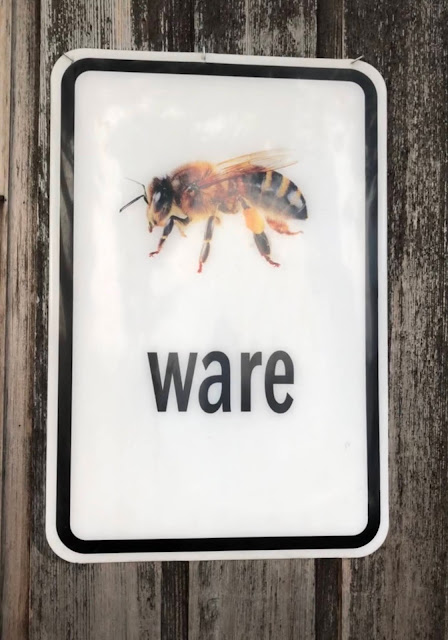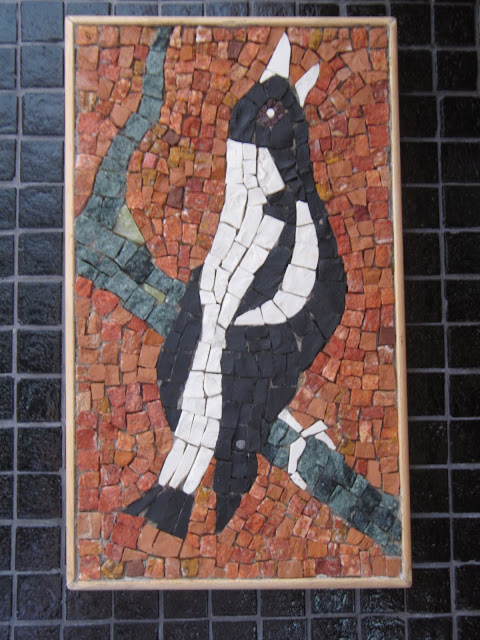 |
| Channel-billed Cuckoo Hatching a Parasitic Plot H. Goodchild lithograph, 1919 |
Does your polis feel like Cloudcuckooland, dear Reader?
_frontispiece.jpg) |
| Aristophanes Plotting more Plots |
Fear not, I am not going to launch into some Opinions about Aristophanes' comedy The Birds, as I've not read it, except to give you some excellent advice that therein the player ol' Pisthetaerus reminds us, "words give wings to the mind and make a man soar to heaven", so a goodly bit of reading may be in order whenever one does feel stuck in the doldrums.
I'm merely wondering if you've noticed the annual arrival of Strange Visitors to these shores? For 'tis the season of the Channel-billed Cuckoo migration. Not that I've actually seen the beast in question, despite its enormous size as the world's largest parasitic cuckoo. No, the Scythrops novaehollandiae announces its presence with its spooky, otherworldly call around dawn and is a portent that summer approacheth. And that birds clearly originated in the Jurassic Period.
 |
| Warning Sign of Summer |
Unlike the dear but dopey Mutton-birds that occasionally drop from the sky on their massive migration to rocky roosts around these shores, these rather more unattractive visitors have merely flown in from New Guinea and Indonesia (and time-travelled around 200 million years, if you hear one) and make a bee-line for trees in our urban bits of greenery to meet up with more of their kind for a bit of hanky-panky and then an egg deposition in a nest of an unsuspecting Crow, Currawong or Magpie.
We did once witness a harried Wattlebird feeding another species of Cuckoo, at our Home by the Sea, and it was neither a pretty sight nor a credit to the reputed intelligence of our bird species, for Love is truly Blind when it comes to the guileless parents raising these interloping children.
 |
| The Australian Magpie - Favourite Bird Around These Parts L. Weiss mosaic, 2017 |
As yet, we've never seen a beloved Maggie around the condominio try to desperately feed an insatiably hungry baby half its size again, but they must fall prey enough times for there to be at least one Channel-billed Cuckoo to haunt the trees nearby every year. And I also heard an echoing cry waft through the open windows of my ballet class the other morning, so they lurk around the wharves by the harbour, too.
Yesterday I did hear but not see a momentary aerial dog-fight outside between a Cuckoo and a couple of Currawongs, so I'd hazard there's an egg ready to drop. And the primeval battle for survival starts afresh.
 |
| Birds Mobbing the Stage at the University of Cambridge H. G. Glindoni etching, 1883 |
Somehow I don't think Aristophanes had the Scythrops novaehollandiae in mind when he included the Cuckoo in the roll call of birds in his play, these strange beasties being rather, ahem, less melodious and pretty than their European kith & kin.
But yet he did describe them as the former rulers of the Egyptians and Phoenicians, which would imply some ferocity of demeanour, and attributes to their call the proverbial cracking of a whip for the Phoenicians to reap their fields:
"Cuckoo! Cuckoo! go to the fields ye circumcised!"
Image credits: 1: Antique Print & Map Room; 2: Wikimedia Commons; 3, 4: Flying With Hands; 5: Wikimedia Commons
Hello Pipistrello, That Channel-billed Cuckoo doesn't sound so bad to me. I would exchange it for the pigeons around here anytime! For threatening birds taking over, Alfred Hitchcock (as always) did it best in his iconic film The Birds. If for some reason this has escaped you, I recommend watching it immediately.
ReplyDelete--Jim
Dear Jim, ooh yes, I do hear you! I have a separate tale to tell of the pigeon variety, and we also have, ahem, delightful flocks of ibis making a racket and a mess in our parks. They are colloquially known as bin chickens. AH's own Birds I am familiar with, but haven't watched in an age. Indeed, it's Mr. P's favourite Hitchcock. A still shot from the film made it onto a previous post as a fanciful adornment to some words but I rather leant toward a Grecian comedy than a Hitchcockian horror today.
DeleteThe Birds is a play I will always remember for an unforseeing event. I was long looking forward to seeing this play, and finally did so - at the The Stratford Festival. I think it was only halfway into Act I when the lights all went out. It was the great lights-out event that hit the eastern part of North America. I don't remember which year it was. I never got to see the play finished.
ReplyDeleteYou get a prize, dear Ur-spo, for both being able to say you saw the play and for your excellent memory! We don't have iconic Great Lights-Out to tag to life's milestones so much in this land, rather Great Droughts and Great Floods. As to what happens in the play, I cannot enlighten you as I haven't seen or read it but I'll wing it with a sort of comic Happily Ever After!
DeleteUff! I read all Aristophanes plays and watched some. Is that bad, Lady Pipistrello?
ReplyDeleteSurrounded by more and more flat Earthers and tinfoil hatters, I sometimes wish, indeed, I lived in Cloud-Cuckoo-Land. Perhaps, rather than the birds, three billion modern Lysistratas could do the trick.
Of course, dear Sean, I should have expected nothing less from you, and no, it is not a bad thing. I felt a small reassurance was in order for the Dear Reader who might fall down in a pink fit if I started an epistle on Cloudcuckooland and Aristophanes on a mild Sunday. Fair warning should always be given for when I'm about to climb on a soapbox. As a theory goes, calling for 3B Lysistratas could be worth a shot to fix some of what ails the Modern World, but, like every fine theory, the Law of Unintended Consequences would undoubtedly apply.
DeleteBird life can be quite entertaining. We have red tail hawks swooping to the forest floor to grab a chipmunk for their morning meal. Then there are wild turkeys doing the male turkey dance and face off, with the winner taking all. When the young emerge, the female is very nurturing as she raises her downy yellow young.
ReplyDeleteDear Susan, my eyebrows shot right up when I read about your witnessing the snackability of chipmunks! A youthful diet of Chip 'n' Dale never alerted me to that kind of hazard in their cheery world. I did have a quick google to check the visage on your wild turkey and he's a plump and handsome critter, as turkeys go, so would make for an afternoon's easy entertaining. Unlike our own variety, the bush turkey, which is both pug-ugly and a nuisance in the garden so cannot be borne to watch.
DeleteWhat clever birds they are. I have noticed that once fattened and fledged, the young Cuckoos re-join their true parents, and fly around together. One year I saw a family of about 6 getting ready to leave for wherever they go in Winter.
ReplyDeleteI have been wondering, dear Cro, about what happens when these cuckoos fledge. It's all so mysterious as to the whys and wherefores that get fostered birds migrating back to their wintering grounds after being raised by birds that never leave their own backyard. Your observation of a family reunion is intriguing! I shall have to investigate further.
DeleteDear Pip, our cuculus is of course smaller than yours - and was one of the first words the triplets said (after Mama and Papa). They heard it call so often! And named a little forest after it: the cuckoo-forest where they always wanted to go to - and when the cuckoo left for Africa they always pointed south to show me where it has gone, my task was the reassuring words: "In spring it comes back".
ReplyDeleteIn Germany the cuckoo was 2008 the "bird of the year". I've often heard it, but never saw one. We have a superstition that you should knock on your purse when you hear it in spring - then you will have enough money allover the year.
I know that it can change the colour of its eggshell to fool the poor birds they are deceiving.
Human Cuckoo-children there are a lot - my mother always warned me to look into a pram and coo "Oh, it looks like the spitting image of your husband!" - she added "You never know" (the woman will :-)
The poor husband might live in Wolkenkuckucksheim - the German translation of Cloud Cuckoo Land, and as Aristophanes showed: he is naive, "unaware of realities" - which I think might make a person sometimes quite happy? Although.... no...I do not like the moral of cuckoos.
How adorable, dear Britta, to have "cuckoo"-ing triplets! Like 3 Bavarian cuckoo clocks going off at once! And therein lies a clue, no doubt, to Germany's fondness for the bird. And I'll keep your superstition in mind for next year, although it will necessitate going to bed with my purse under my pillow, for it's around dawn that we first hear them, and I am not up and about at that ungodly hour! Your mother, by the way, sounds like a woman with much wisdom to impart :) And that's a rather sweet word to have at the ready - Wolkenkuckucksheim. I just have to spot a cuckold first!
Delete